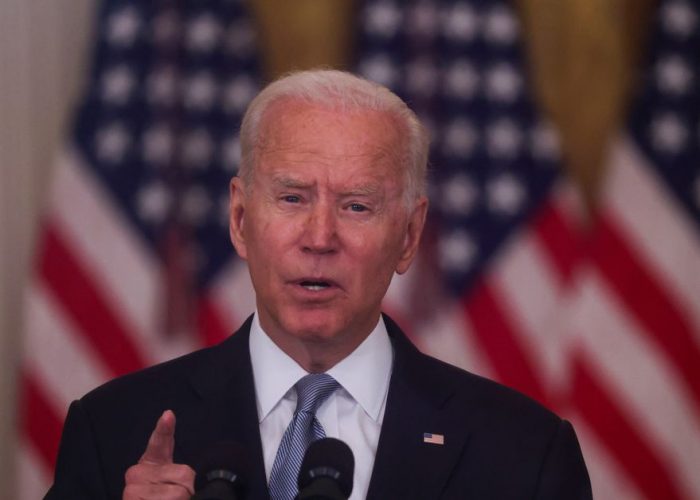U.S. President Joe Biden delivers remarks on the crisis in Afghanistan during a speech at the White House in Washington, August 16, 2021. REUTERS/Leah MillisNEW YORK, Aug 17 (Reuters Breakingviews) – Americas chaotic departure from Afghanistan demonstrates horribly inadequate foresight and planning. The human effects are dire, and so could be the politics. Even so, the big-picture economic case for pulling out is clear. President Joe Biden is just the chief executive who finally took the decision.
The rapid return of the Taliban, less than a month before the 20th anniversary of the Sept. 11 attacks that led President George W. Bush to invade Afghanistan in late 2001, is shocking. For many inside the country, its likely to be far worse than that.
The cold cash picture is, however, persuasive from the U.S. perspective. The cumulative cost of the war is $2.3 trillion and counting, according to Brown University, with the loss of almost 2,500 U.S. soldiers, more from coalition partners, and nearly 250,000 lives altogether. With Washingtons borrowing mounting, the dollar figure accounts for 10% of federal debt held by the public, according to the Congressional Budget Office.
The benefit, assuming it can be attributed to the invasion, has been avoiding another Sept. 11. One rough estimate for the direct impact of those events on the U.S. economy, put forward by a Department of Homeland Security economist in 2009, was a 0.5% hit to GDP. Based on todays output level, that would be a bit over $100 billion. That doesnt capture global fallout or, say, specific travel-industry losses. Nor does it include the worlds broader response, in security spending for example.
Even if the reality is several times larger, the avoided cost is dwarfed by the expense of the wars that followed, of which Afghanistan is only one. Add Iraq and Syria, and the outlay rises to more than $5 trillion, excluding trillions of dollars more in future interest payments and healthcare obligations to veterans, by Brown’s figures.
Twenty years on, a campaign in a region that has thwarted armies since the time of Alexander the Great needed to end. Both Bidens predecessor Donald Trump and, before him, Barack Obama wanted out. A continued modest, less expensive presence, advocated by some Biden critics, is not credible as a long-term approach. Afghanistan’s ongoing state of civil war and the weakness of its U.S.-backed military and government even after 20 years speak to that, as do knowledgeable accounts showing that a big chunk of spending on so-called nation-building found its way into anti-government hands.
Trump’s deal with the Taliban last year narrowed the options, but the buck for the immediate mess stops with Biden. Future leaders may thank him for pulling the troops out. But because politics and American power are about more than financial costs and benefits, he may still regret it.
Follow @richardbeales1 on Twitter
CONTEXT NEWS
– President Joe Biden on Aug. 16 defended his decision to withdraw U.S. troops from Afghanistan and rejected broad criticism of the chaos that has followed.
– Thousands of civilians desperate to flee Afghanistan thronged Kabul airport after the Taliban seized the capital, prompting the United States to suspend evacuations as it came under mounting criticism at home over its pullout.
– The Taliban’s rapid conquest of Kabul followed Biden’s decision to withdraw U.S. forces after 20 years of war.
Editing by George Hay and Amanda Gomez
BreakingviewsReuters Breakingviews is the world’s leading source of agenda-setting financial insight. As the Reuters brand for financial commentary, we dissect the big business and economic stories as they break around the world every day. A global team of about 30 correspondents in New York, London, Hong Kong and other major cities provides expert analysis in real time.
Sign up for a free trial of our full service at https://www.breakingviews.com/trial and follow us on Twitter @Breakingviews and at www.breakingviews.com. All opinions expressed are those of the authors.read more
Economic case for U.S. Afghanistan exit is clear – Reuters


